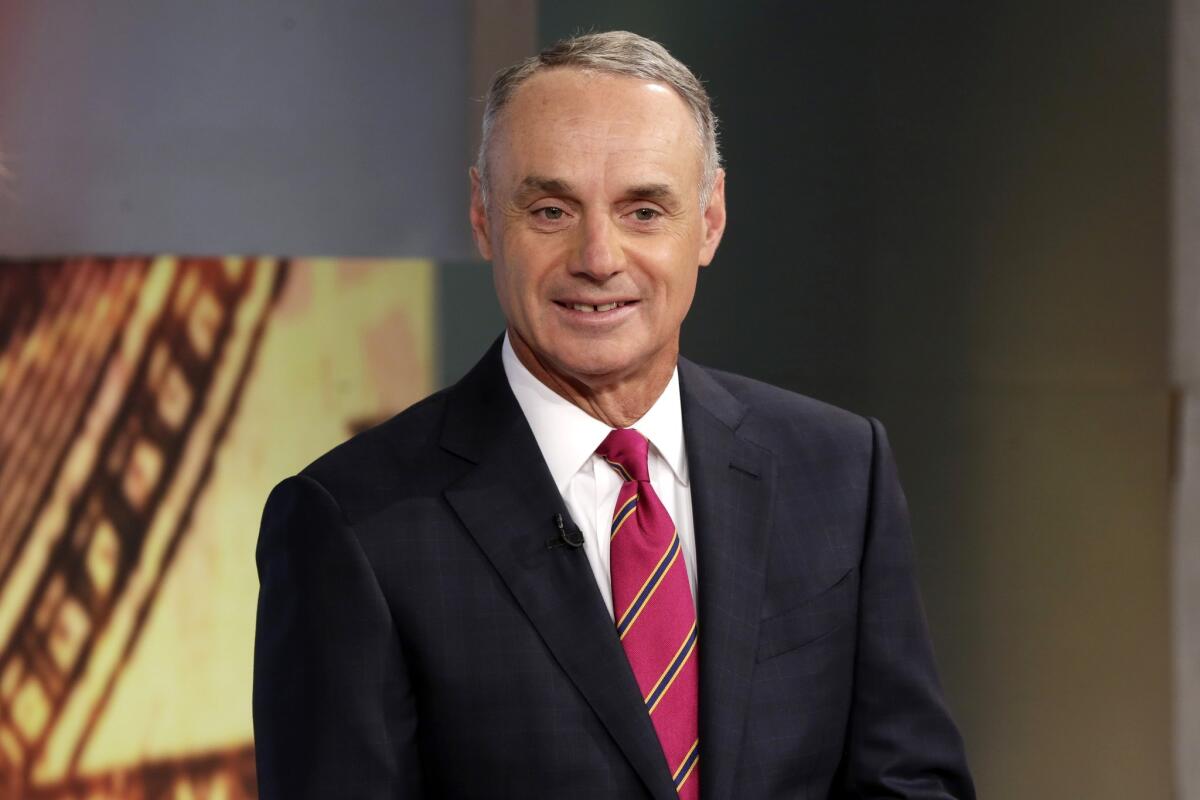Baseball Commissioner Rob Manfred says MLB would regret it if Athletics left Oakland

If a professional sports team considers moving from a city, the sports league generally warns that the city would come to regret it. On Tuesday, Major League Baseball Commissioner Rob Manfred warned that the league would regret it if the Oakland Athletics moved from the city.
“I am committed to Oakland as a major league site,” Manfred said Tuesday. “If we were to leave Oakland, I think 10 years from now, we would be more likely than not looking backward, saying we made a mistake.”
Manfred’s comments are rooted in demographic reality, in Oakland and elsewhere. As the cost of living in the Bay Area becomes prohibitively expensive in San Francisco and its southern peninsula, growth and gentrification have boomed in Oakland and the surrounding East Bay.
See the most-read stories in Sports this hour >>
“I think Oakland is more likely than not to be a better market five years from now than it is today,” Manfred said in a meeting with the Baseball Writers Assn. of America. “So I certainly have not given up on Oakland.”
With the San Francisco Giants refusing to yield their territorial rights to San Jose — the stadium site long preferred by A’s ownership — Manfred has directed the A’s to focus on Oakland, whether on the current Coliseum property or elsewhere in the city.
Although the team’s search for a new ballpark has entered its third decade, the league’s reluctance to abandon the market almost certainly reflects the lack of viable alternatives in the United States. Manfred has said Montreal and Mexico City are two prime candidates should MLB pursue expansion or relocation.
On Tuesday, he said expansion would not be considered until the stadium situations in Oakland and Tampa Bay are resolved. The Rays are exploring options for a new stadium; owner Stuart Sternberg has said he would not move the team but would consider selling it to someone who would.
Manfred also indicated he had little sympathy for those players suspended under baseball’s drug policy who subsequently claim they had no idea how a banned substance entered their bodies.
“I don’t know how it got there,” Manfred said. “Maybe the players don’t know how it got there. I know it’s there. And it’s against our rules.”
In the wake of such suspensions, players including Detroit Tigers pitcher Justin Verlander and Atlanta Braves outfielder Jeff Francoeur have taken to Twitter to urge tougher penalties. Under baseball’s drug policy, the penalty for a first-time offense is 80 games.
Tony Clark, executive director of the Major League Baseball Players Assn., said he did not believe the majority of players would agree that punishments under the drug policy needed to be stricter.
“On the whole, no,” Clark said. “I think it’s great guys have weighed in. I think it’s great they’re as passionate as they are. There are areas worth talking about that have nothing to do with the penalties.”
Clark, speaking generally, said he encourages players to participate on social media but to think twice before hitting ‘send.’
Said Clark: “I have a Twitter account. I never tweet. I stalk everybody.”
Twitter: @BillShaikin
MORE FROM SPORTS
Jordan Spieth and Rory McIlroy approach Olympic golf debate from opposite sides
Lynx players won’t wear Black Lives Matters shirts Tuesday following police officers’ walkout
Dodgers Dugout: Who is the only Dodgers hitter to get an ‘A’ in the mid-season report card?
More to Read
Go beyond the scoreboard
Get the latest on L.A.'s teams in the daily Sports Report newsletter.
You may occasionally receive promotional content from the Los Angeles Times.











